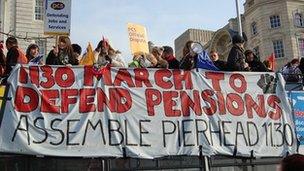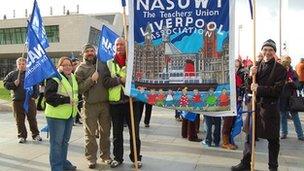Liverpool strikers march from Pier Head
- Published

Thousands of people marched through the city centre
About 4,500 public sector workers marched through Liverpool over proposed changes to public sector pensions.
The protesters joined in the national day of action organised by the Trade Unions Congress (TUC).
The dispute led to the closure of the two Mersey Tunnels linking Liverpool and Wirral, and most schools, libraries and sports centres were unable to open.
The government said the strikes could cost the economy £500m and criticised the decision to walk out during talks.
At Prime Minister's Questions, Mr Cameron said he thought the government had made a "very reasonable, very fair offer to public sector workers".
"I don't want to see any strikes, I don't want to see schools closed, I don't want to see problems at our borders, but this government has to make responsible decisions," he said.
In Liverpool, workers supporting the strike formed picket lines outside many public buildings and government offices before making their way to the Pier Head.
The group then set off on a march which headed through the city's main shopping streets to a rally at St George's Plateau.
Speaking from the picket line outside Liverpool City Council's Municipal Buildings, Bobby Daniels, GMB member and chairman of the council's Joint Trade Unions committee, said: "We've got a lot of people who've worked a long time and need looking after.
"This is going to reduce the pension of everyone who works in local authorities and it is not acceptable to us."
Jimmy Cousins, from the Unite union, was one of hundreds of teachers who met at the Pier Head for the march.
He said: "I can see the amount of funding pulled out of Liverpool since the coalition came into power, and it's going to take Liverpool back to how it was in the 1980s.
"Cameron's gone one step further than Thatcher. She only took our milk - Cameron wants to take out pensions."
Schools closed
In Wirral, union members joined a march from Birkenhead Park to Hamilton Square where a rally was held.
Unions said an estimated 30,000 teachers across Merseyside took part in the strike.
Liverpool City Council said 165 of the city's 170 schools were closed, as were all council-run day and youth centres and many children's centres.
The city's refuse collection service was operating as normal.
In Sefton, the majority of the borough's 92 schools were closed.
One school, Birkdale Primary, was open and four others were partially open.
Sixty two schools in St Helens were closed, with one fully open and one partially open.

NASUWT members joined the protest at the Pier Head
In Wirral, 118 out of 127 schools were fully closed to pupils. Seven schools were partially open and only two were fully open to pupils.
Warrington had 72 schools closed out of 85.
Tunnel operators Merseytravel said the tunnels, which usually see 88,000 journeys a day, closed to the public at 23:45 GMT on Tuesday and would reopen at 00:15 GMT on Thursday.
The Kingsway Tunnel remained open for the use of the emergency services and priority health workers.
The Mersey Ferries were also out of service due to strike action but Merseyrail services were running as normal.
Merseyrail said extra carriages would be added but passengers were being warned services would be very busy.
Services at Liverpool John Lennon Airport were expected to be disrupted as passport and immigration staff support the strike.
The Identity and Passport Service (IPS) in Liverpool said its public counter would be closed as staff join the walkout.
A spokesman said it was the first time the IPS had closed as a result of industrial action.
The Royal Liverpool Hospital reduced its services in line with the NHS across the country.
A spokeswoman said most out-patient appointments were cancelled and routine surgery was postponed.
She said it was running a full range of critical and emergency services.
- Published30 November 2011
- Published1 December 2011
- Published1 December 2011
- Published28 November 2011
- Published27 November 2011
- Published10 September 2012
- Published25 November 2011